Search Images
Browse Content (p. 1164)
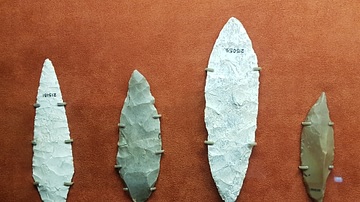
Image
Solutrean Spear Points
Palaeolithic spear points belonging to the Solutrean industry which flourished in what is now southwestern France between c. 21,000-c. 17,000 years ago. They were made by early modern humans (Homo sapiens). Points shaped like laurel leaves...
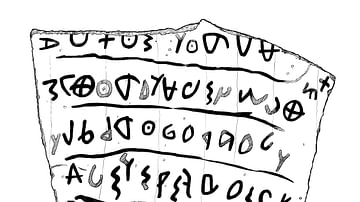
Image
Khirbet Qeiyafa Ostracon
An illustration showing the markings of an ostracon (pottery sherd) from Khirbet Qeiyafa, Israel. The sherd is cited as evidence that the Hebrew language was in use from the 10th century BCE. The text has been interpreted as a social statement...
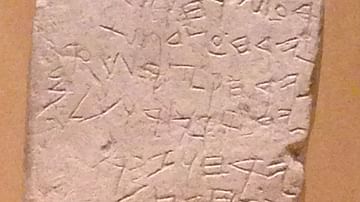
Image
Gezer Calender
The Gezer Calendar stone. The stone, possibly dating to the 10th century BCE, carries an inscription in Phoenician or Hebrew outlining a series of dates and accompanying agricultural tasks. It was discovered and deciphered by R.A.S.Macalister...
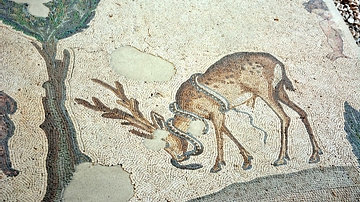
Image
Stag & Snake, Byzantine Mosaic
The stag and the snake mosaic: In some ancient texts, the stag is seen as a rival to the snake. It can also draw a snake out of its hole with its breath. The deer was a symbol of fertility and the animal of Artemis. The stag is illustrated...
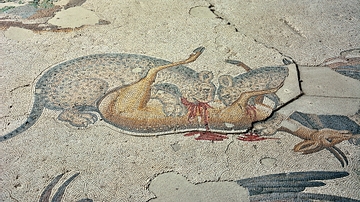
Image
Leopards Hunting Deer, Byzantine Mosaic
Leopards hunting a deer, Byzantine Mosaic, Period: Early Byzantine, circa: 6th century CE. Place: Constantinople, (Modern Istanbul, Turkey). Great Palace Mosaic Museum, Istanbul, Turkey. The Great Palace Mosaic Museum was inaugurated in...
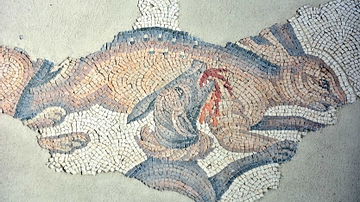
Image
Hunting Rabbits, Byzantine Mosaic
Hunting Rabbits: The dogs are attacking the rabbit on its neck and abdomen. The hunter is depicted having just released the dogs, Byzantine Mosaic, Period: Early Byzantine, circa: 6th. century CE. Place: Constantinople, (Modern Istanbul...
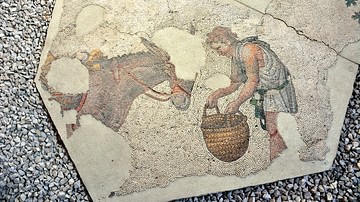
Image
Man Feeding Mule, Byzantine Mosaic
A man is feeding his mule, Byzantine Mosaic, Period: Early Byzantine, circa: 6th century CE. Place: Constantinople, (Modern Istanbul, Turkey). Great Palace Mosaic Museum, Istanbul, Turkey. The Great Palace Mosaic Museum was inaugurated...
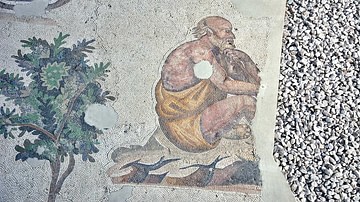
Image
Philosopher, Byzantine Mosaic
A philosopher sitting on a rock. Byzantine Mosaic, Period: Early Byzantine, circa: 6th century CE. Place: Constantinople, (Modern Istanbul, Turkey). Great Palace Mosaic Museum, Istanbul, Turkey. The Great Palace Mosaic Museum was inaugurated...
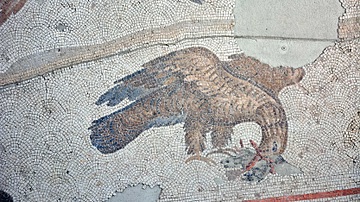
Image
Eagle, Byzantine Mosaic.
Details from the pastoral compositions in the Great Palace mosaics, Istanbul, Turkey. Period: Early Byzantine, circa: 6th century CE. Place: Constantinople, (Modern Istanbul, Turkey). The Great Palace Mosaic Museum was inaugurated in...
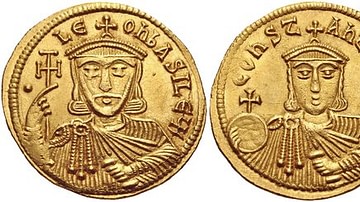
Image
Leo V the Armenian
A gold solidus (nomisma) coin of Byzantine emperor Leo V the Armenian (r. 813-820 CE). The reverse side shows his son Constantine. (Classical Numismatic Group, Inc. http://www.cngcoins.com)